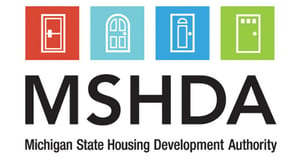
Authority continues to support regional goals and priorities of Statewide Housing Plan
LANSING, Mich. – The Michigan State Housing Development Authority (MSHDA) announced over $30 million has been reserved through MI Neighborhood for more than 75 grants that will support the construction and rehabilitation of 716 housing units across the state along with 15 public amenities projects. The full list of grants and projects can be found on the MI Neighborhood website.
MI Neighborhood, which launched in April, is open to for- and nonprofit developers and local units of government. Applications will continue to be accepted as long as funding remains. Regional investment targets have been established using an equitable, transparent, data driven strategy that aligns with Michigan’s Statewide Housing Plan.
“Our success in identifying and awarding housing projects for MI Neighborhood shows that we are making real strides to improve Michigan’s housing landscape,” said Amy Hovey, CEO and Executive Director of MSHDA. “I’m proud that we’re supporting projects in every region. We’re going to keep listening to our local and regional housing leaders and implementing solutions that meet their goals and the priorities of the Statewide Housing Plan.”
MI Neighborhood is supported by MSHDA’s Housing and Community Development Fund and the federal Community Development Block Grant. The program is intended to be low-barrier and uses a common application that is accessible to experienced and emerging community developers, and municipal leaders. Projects that are most aligned with the regional action plans developed under the Statewide Housing Plan are being prioritized, and applications are reviewed on a rolling basis as they are received.
Interested applicants can access the program at Michigan.gov/MINeighborhood.
###
About MSHDA
The Michigan State Housing Development Authority (MSHDA), established in 1966, provides financial and technical assistance through public and private partnerships to create and preserve safe and decent affordable housing, engage in community economic development activities, develop vibrant cities, towns and villages, and address homeless issues.

















